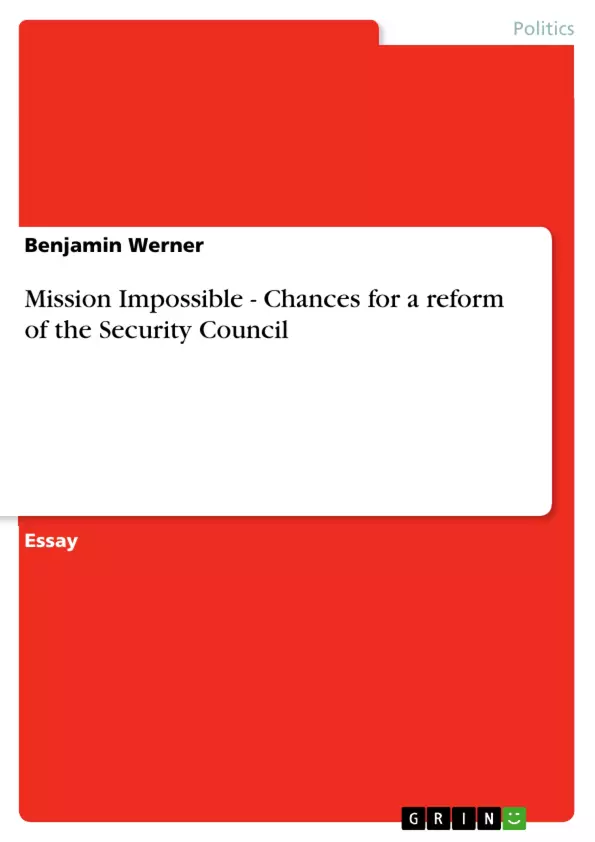The community of states in the world is facing an important century. After the East-West conflict and the end of bipolar foreign politics, a wide range of new alliances construct the international political system. At the same time it gets clear that today’s challenges ask for a new kind of international cooperation. The United Nations organization (UN) offers an arena for collective work on the big topics of the modern world. Peacekeeping around the globe and the fight against terrorism are two of the major points of the agenda that are treated in the organization’s most important board, the Security Council. But the organization suffers from a loss of influence on the big players of the international competition.
In my work I will present shortly the history of the United Nations before I go into the functions and the composition of the Security Council. I will explain the critical points and focus on the debate concerning a reform of the board. After presenting different resolutions out of the current international debates, I will bring the discussion and the attitude of the five permanent members of the Security Council in relation to the theory of political realism.
Inhaltsverzeichnis (Table of Contents)
- Introduction
- Brief overview of the United Nations' history
- About the Security Council
- Modernizing the United Nations
- Focus on the reform of the Security Council
- The theory of Political Realism
- The blockade of the reform
- Conclusion
Zielsetzung und Themenschwerpunkte (Objectives and Key Themes)
This paper analyzes the challenges faced by the United Nations Security Council in the 21st century and explores the feasibility of reforming the council. The author examines the historical development of the UN, the current composition and functions of the Security Council, and the debates surrounding its reform. The focus is on the role of political realism in shaping the current impasse over reform.
- The historical development and evolution of the United Nations
- The composition, functions, and limitations of the Security Council
- The need for reform and the various proposals for change
- The impact of political realism on the reform process
- The current obstacles to reforming the Security Council
Zusammenfassung der Kapitel (Chapter Summaries)
The introductory chapter establishes the context for the paper by discussing the changing nature of international politics in the post-Cold War era and highlighting the need for a more effective international cooperation framework. The second chapter offers a concise overview of the UN's history, emphasizing the origins of the Security Council and the establishment of its structure and functions. The third chapter provides detailed insights into the composition, working procedures, and powers of the Security Council, including the critical role of the veto power held by the permanent members.
The fourth chapter explores the broader context of UN reform, highlighting the need for a more representative and effective organization in the face of new challenges such as terrorism, global poverty, and climate change. This chapter analyzes the various proposals for reform, focusing on the debate over the composition and decision-making processes within the Security Council. The fifth chapter delves into the theoretical framework of political realism and its implications for the reform process. The author examines how the principles of realism, such as national self-interest and power politics, have shaped the positions of the permanent members of the Security Council regarding reform.
Schlüsselwörter (Keywords)
This paper examines the key themes and concepts related to the challenges and prospects of reforming the United Nations Security Council. It focuses on issues such as international cooperation, peacekeeping, political realism, power politics, and the role of the permanent members. The paper also explores the historical development of the UN, the composition and functions of the Security Council, and the various proposals for reform.
Frequently Asked Questions
What is the main function of the UN Security Council?
The Security Council is responsible for maintaining international peace and security, including authorizing peacekeeping missions and imposing international sanctions.
Who are the permanent members of the Security Council?
The five permanent members (P5) are the United States, Russia, China, France, and the United Kingdom. They all hold veto power.
Why is it so difficult to reform the Security Council?
Reform is blocked primarily because any change to the UN Charter requires the approval of all P5 members, who are often unwilling to give up their exclusive power or veto rights.
What does "Political Realism" say about UN reform?
Political realism suggests that states act primarily in their own national self-interest and power politics, leading to a deadlock when global cooperation conflicts with national power.
What are the common proposals for Security Council reform?
Proposals include expanding the number of permanent members (e.g., adding Germany, Japan, India, or Brazil) and limiting or abolishing the veto power.
- Quote paper
- Benjamin Werner (Author), 2008, Mission Impossible - Chances for a reform of the Security Council, Munich, GRIN Verlag, https://www.grin.com/document/112653



